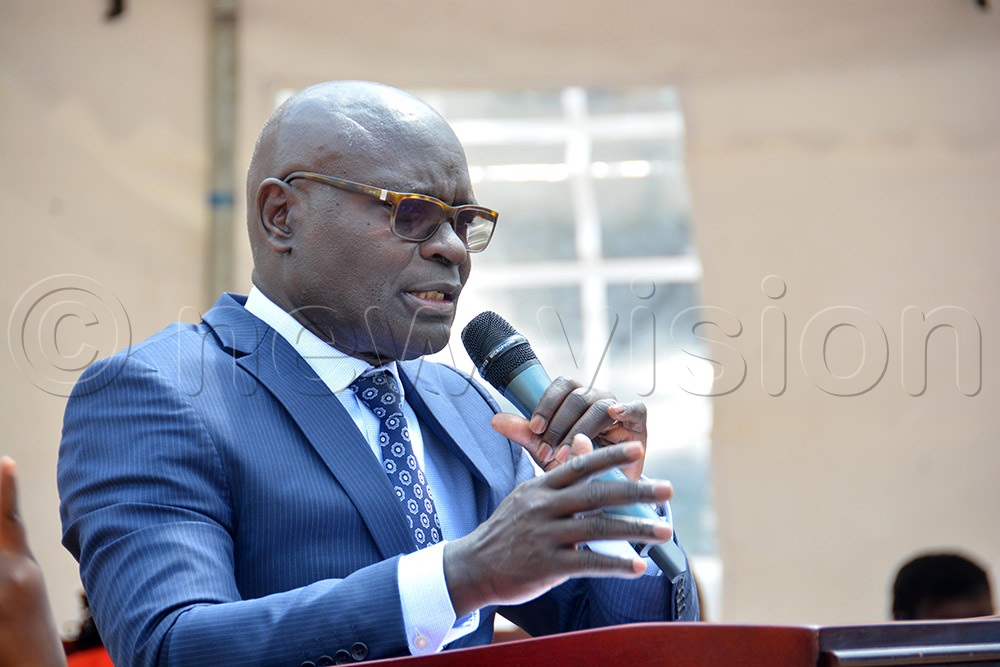EC to political parties: 'Resolve internal disputes before nominations'
EC chairperson Justice Simon Mugenyi Byabakama said political parties must present undisputed, legitimate candidates to avoid chaos and confusion during the official nomination process.
The Electoral Commission Chairperson Justice Simon Byamakama (right) and sign language interpreter Hope Nyamwiza addressing a press conference at the commission headquarters in Kampala on July 18, 2025. (Photo by Francis Emorut)
By Ibrahim Ruhweza
Journalists @New Vision
___________________
As Uganda edges closer to the 2026 general elections, the Electoral Commission (EC) has urged political parties and aspirants to resolve internal disputes before nomination.
EC chairperson Justice Simon Mugenyi Byabakama said political parties must present undisputed, legitimate candidates to avoid chaos and confusion during the official nomination process.
He made the remarks on Friday (July 18) during a press conference at the commission's headquarters in Kampala.
Byabakama announced an adjustment to the nomination dates for presidential candidates from October 2-3 to September 23-24, 2025.
The Electoral Commission Chairperson Justice Simon Byamakama addressing a press conference at the commission headquarters in Kampala on July 18, 2025. (Photo by Francis Emorut)
According to the EC, this shift was necessary to accommodate key post-nomination activities such as capturing nomination returns, producing sample ballot papers, harmonising campaign programmes, and signing memoranda of understanding by presidential candidates.
“The Commission realised that maintaining the earlier nomination dates would drastically reduce the campaign period for presidential candidates,” said the EC chairperson.
“We encourage all political parties to urgently address any internal grievances and finalise their candidate selection processes.”
Nominations for local government positions, including special interest groups, will take place between September 3 and 12, while parliamentary nominations are scheduled for September 16 and 17.
Special interest group nominations at the local level will follow from December 8 to 12, 2025.
Campaigns for all elective positions will begin shortly after the nominations: local government campaigns will run from September 13, parliamentary campaigns from September 23, and presidential campaigns from October 4 — all ending on January 12, 2026.
Voting across all categories — presidential, parliamentary, and local government — will be held between January 12 and February 9, 2026.
The exact dates for each category will be announced after nominations, as stipulated by the law.
In preparation for nominations, the EC also highlighted key legal requirements.
For instance, presidential aspirants must secure 100 registered voters’ signatures from at least 97 districts. Guidelines and collection timelines for these supporter forms will soon be announced.
Regarding academic qualifications, the Commission reiterated that aspirants for President, Member of Parliament, and top local government positions must possess an A'Level certificate or equivalent.
Byabakama noted that those with foreign qualifications must obtain equivalence certificates from the National Council for Higher Education (NCHE) and submit them to the EC at least two months before nomination. However, individuals with A'Level or higher qualifications obtained in Uganda are exempt from this verification.
“Candidates who contested in previous elections using equivalent certificates must obtain fresh verification if their educational situation has changed, especially if they’ve now acquired degrees abroad,” clarified Byabakama.
He further condemned recent reports of violence and fatalities during party primaries, urging all political actors to embrace peaceful dispute resolution.
“Violence has no place in our democracy. Ugandans deserve peaceful, fair, and transparent elections. We must all do our part to maintain national stability.”
